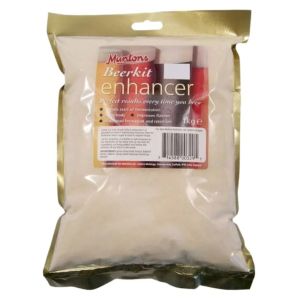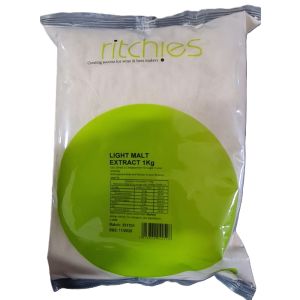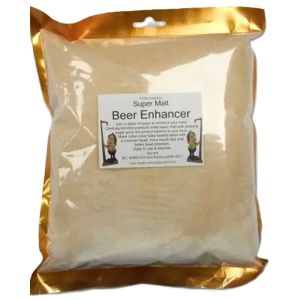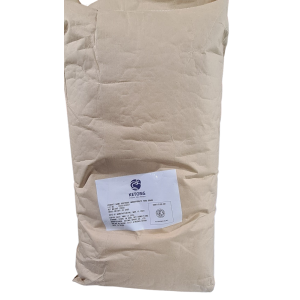Brewing Sugar 1kg - Dextrose Monohydrate
Brewing sugar also known as Dextrose monohydrate and is used instead of normal sugar, as it can contribute to a fuller body and smoother mouthfeel of the beer
- Buy 10 for £2.45 £2.04 each and save 5%
Why is it best to use Brewing Sugar for Home Brewing?: A Comprehensive Guide to Brewing Sugar
Are you a homebrewing enthusiast looking to improve the quality of your brew? Look no further than brewing sugar. In this comprehensive guide, we will explore why brewing sugar is the best choice for your homemade beer, mead, or cider.
Brewing sugar, also known as dextrose, is a fermentable sugar that is specifically designed for brewing. Unlike regular table sugar, brewing sugar is highly soluble and quickly consumed by yeast, resulting in a clean fermentation process and a smooth, well-balanced flavour profile.
One of the key advantages of using brewing sugar is its ability to boost fermentation. The addition of brewing sugar provides the yeast with easily digestible food, resulting in a faster and more efficient fermentation process. This not only reduces the risk of off-flavours but also ensures that your beer reaches its desired alcohol content.
Furthermore, brewing sugar is known for its ability to create a lighter and drier finished product. It adds minimal sweetness to the brew, allowing the flavours of the other ingredients to shine through.
Whether you're a seasoned homebrewer or just starting out, brewing sugar is an essential ingredient that will elevate your brew to the next level. So grab your fermenter and get ready to brew the best beer of your life.
What is brewing sugar and why is it used in home brewing?
Brewing sugar, also known as dextrose, is a fermentable sugar that is specifically designed for brewing. Unlike regular table sugar, brewing sugar is highly soluble and quickly consumed by yeast, resulting in a clean fermentation process and a smooth, well-balanced flavour profile.
Using brewing sugar in home brewing offers several advantages. Firstly, it provides a readily available source of food for the yeast, which promotes a faster and more efficient fermentation process. This means that your beer, mead, or cider will reach its desired alcohol content in a shorter amount of time.
Secondly, brewing sugar is known for its ability to create a lighter and drier finished product. It adds minimal sweetness to the brew, allowing the flavours of the other ingredients to shine through. This is particularly important if you're brewing a beer style that requires a crisp and dry finish, such as a pilsner or a pale ale.
Lastly, brewing sugar is highly soluble, which means that it dissolves easily in water. This makes it convenient to use in the brewing process, as you won't have to worry about any undissolved sugar particles affecting the final product. Overall, brewing sugar is an essential ingredient that can significantly enhance the quality of your homemade brew.
Types of brewing sugars and their characteristics.
There are different types of brewing sugars available on the market, each with its own unique characteristics. The most common types include:
1. Dextrose: Dextrose is the purest form of brewing sugar and is derived from corn. It is highly fermentable and produces a clean and crisp finished product. Dextrose is often used in light beer styles, as it adds minimal flavour and body.
2. Liquid Malt Extract (LME): LME is a concentrated syrup made from malted barley. It contains a significant amount of unfermentable sugars, which adds body and flavour to the brew. LME is commonly used in extract brewing, where malt extract is combined with water and hops to create a wort.
3. Dry Malt Extract (DME): DME is similar to LME but is in a powdered form. It is also made from malted barley and provides the same benefits of adding body and flavour to the brew. DME is convenient to use and has a longer shelf life compared to LME.
4. Sucrose: Sucrose, or table sugar, is another type of brewing sugar that can be used in home brewing. However, it is less commonly used compared to dextrose, as it can result in a slightly sweeter finished product. Sucrose can be used in certain beer styles that benefit from a touch of sweetness, such as Belgian ales.
When choosing a brewing sugar, it's important to consider the characteristics of each type and how they will contribute to the flavour and body of your brew. Experimenting with different types of brewing sugars can help you achieve the desired results in your homebrewing journey.
Benefits of using brewing sugar in home brewing.
Using brewing sugar in your homebrew offers several benefits that can greatly enhance the quality of your brew. Here are some key advantages:
1. Improved fermentation: Brewing sugar provides yeast with easily digestible food, resulting in a faster and more efficient fermentation process. This reduces the risk of off-flavours and ensures that your beer reaches its desired alcohol content.
2. Lighter and drier finished product: Brewing sugar adds minimal sweetness to the brew, allowing the flavours of other ingredients to shine through. This is particularly desirable in beer styles that require a crisp and dry finish.
3. Convenience: Brewing sugar is highly soluble and dissolves easily in water, making it convenient to use in the brewing process. You won't have to worry about any undissolved sugar particles affecting the final product.
4. Versatility: Brewing sugar can be used in a variety of homemade beverages, including beer, mead, and cider. It is a versatile ingredient that can enhance the flavour, body, and alcohol content of your brew.
By incorporating brewing sugar into your homebrewing process, you can achieve a higher quality brew with improved fermentation, a lighter and drier finish, and a more convenient brewing experience.
How to properly use brewing sugar in the brewing process.
To properly use brewing sugar in the brewing process, it's important to follow a few key steps. Here's a step-by-step guide:
1. Calculate the amount of brewing sugar needed: The amount of brewing sugar required depends on the specific recipe and desired alcohol content. You can use online brewing calculators or consult brewing recipe books to determine the appropriate amount of brewing sugar for your brew.
2. Sanitize your equipment: Before adding brewing sugar to your brew, make sure that all your equipment, including fermenters, airlocks, and brewing utensils, are properly sanitized. This helps prevent any unwanted bacteria or contaminants from affecting the fermentation process.
3. Add brewing sugar to the brew: Once your equipment is sanitized, add the calculated amount of brewing sugar to your brew. This is typically done during the boiling stage of the brewing process, when you're creating the wort. Stir the mixture well to ensure that the brewing sugar is fully dissolved.
4. Monitor fermentation: After adding brewing sugar to your brew, closely monitor the fermentation process. This includes observing the activity in the airlock, checking the specific gravity with a hydrometer, and tasting the brew at various stages. This will help you determine when the fermentation is complete and when it's time to bottle or keg your brew.
By following these steps, you can ensure that brewing sugar is properly incorporated into your brew, resulting in a high-quality and well-fermented homemade beverage.
Common mistakes to avoid when using brewing sugar.
While using brewing sugar in home brewing offers many benefits, there are a few common mistakes that brewers should avoid. Here are some key mistakes to watch out for:
1. Adding too much brewing sugar: Adding excessive amounts of brewing sugar can result in an overly sweet or high-alcohol brew. It's important to carefully calculate the appropriate amount of brewing sugar based on your recipe and desired alcohol content.
2. Not properly dissolving the brewing sugar: Brewing sugar should be fully dissolved in the wort to avoid any undissolved sugar particles affecting the final product. Make sure to stir the mixture well to ensure complete dissolution.
3. Neglecting to sanitize equipment: Sanitizing your equipment is crucial to prevent any unwanted bacteria or contaminants from affecting the fermentation process. Failure to properly sanitize your equipment can lead to off-flavours or spoiled brews.
4. Failing to monitor fermentation: Monitoring the fermentation process is essential to ensure that the brewing sugar is properly fermented and that the brew reaches its desired alcohol content. Neglecting to monitor fermentation can result in incomplete fermentation or over carbonation.
By being aware of these common mistakes and taking the necessary precautions, you can avoid potential issues and achieve the best results when using brewing sugar in your homebrewing endeavours.
Brewing sugar alternatives for different beer styles.
While brewing sugar is a popular choice for many homebrewers, there are alternative ingredients that can be used for specific beer styles. Here are some common brewing sugar alternatives:
1. Honey: Honey can be used as a substitute for brewing sugar in certain beer styles, particularly in meads and honey beers. It adds a distinct flavour and aroma to the brew and can contribute to a sweeter finished product.
2. Molasses: Molasses is a by product of the sugar refining process and can be used as a substitute for brewing sugar in darker beer styles, such as stouts and porters. It adds a rich and robust flavour to the brew.
3. Fruit juice: Fruit juices, such as apple juice or grape juice, can be used as an alternative to brewing sugar in fruit beers or ciders. They add natural sweetness and flavour to the brew, as well as contribute to the alcohol content.
When considering brewing sugar alternatives, it's important to take into account the flavour profiles of the alternative ingredients and how they will complement the overall character of your brew. Experimenting with different ingredients can lead to unique and exciting flavour combinations in your homemade beverages.
Where to buy brewing sugar and how to choose the right one.
Brewing sugar is widely available at homebrew supply stores, online retailers, and some grocery stores. When choosing brewing sugar, it's important to consider the quality and purity of the product. Here are a few tips for choosing the right brewing sugar:
1. Look for reputable brands: opt for brewing sugar from reputable brands that specialize in brewing ingredients. These brands are more likely to provide high-quality and reliable products.
2. Check for purity: Ensure that the brewing sugar is pure and free from any additives or impurities. Pure brewing sugar will provide the best results in terms of fermentation and flavour.
3. Consider the type of brewing sugar: Choose the type of brewing sugar that best suits your brewing needs and the specific beer style you're brewing. Dextrose is a popular choice for most beer styles, while LME or DME may be preferred for extract brewing.
By purchasing brewing sugar from trusted sources and considering the specific needs of your brew, you can ensure that you're using the best quality brewing sugar for your homemade beverages.
Brewing sugar storage and shelf life.
Proper storage of brewing sugar is essential to maintain its quality and effectiveness. Here are some guidelines for storing brewing sugar:
1. Store in a cool and dry place: Brewing sugar should be stored in a cool and dry environment to prevent moisture absorption and clumping. Moisture can affect the solubility of the sugar and lead to difficulties in dissolving it in the brewing process.
2. Seal tightly: Ensure that the packaging of the brewing sugar is tightly sealed to prevent air exposure. Oxygen can degrade the quality of the sugar over time.
3. Check the expiration date: Brewing sugar typically has a long shelf life, but it's important to check the expiration date before use. Expired brewing sugar may not provide the desired results in terms of fermentation and flavour.
By following these storage guidelines, you can prolong the shelf life of your brewing sugar and ensure that it remains fresh and effective for your homebrewing endeavours.
Conclusion: Enhancing your home brewing experience with brewing sugar.
In conclusion, brewing sugar is a valuable ingredient that can greatly enhance the quality of your homemade beer, mead, or cider. Its ability to boost fermentation, create a lighter and drier finished product, and provide convenience in the brewing process makes it an essential tool for homebrewers.
Whether you're a seasoned homebrewer or just starting out, incorporating brewing sugar into your brewing process can take your brew to the next level. By following proper usage guidelines, avoiding common mistakes, and considering brewing sugar alternatives for specific beer styles, you can create high-quality and flavourful homemade beverages.
So, next time you embark on a homebrewing adventure, don't forget to grab your brewing sugar and enjoy the satisfaction of brewing the best beer of your life. Cheers to the art of homebrewing!
The packaging / brand may change, but you will get 1kg of Brewing Sugar
Larsen HomeBrew(UK) Ltd / T/A The Home Brew Shop Delivery Information.
Due to the UK not being part of the EU we no longer offer any shipping to the EU.
Sorry to say We are not able to send any more products to NI due to the GSPR coming in to force on the 13th December 2024
We offer 24-hour and 48-hour Parcel Services, but this does not guarantee that the parcel will be received within this timeframe.
Normal delivery times are on average between 1-3 working days. But sometimes this can be longer During busy times like Christmas and Bank Holidays.
Heavy Parcels those over 1.5kg are delivered by Parcel Force or DHL.
For those under 1.5kg We use Royal Mail 48 hour tracked service.
if a problem happens with the delivery please let us know and we will do our best to help, we can talk to FedEx or DHL to help solve the problem.
We only know of the problem if you tell us about the problem, we can't help if we are not told about the issue.
1st orders with us, parcels will not be left with out a signature OR if we think they are a high value order over £120 parcels will need to be signed for.
Home Brew UK Delivery. (Excluding Northern Ireland)
Mainland UK, Order weight Under 1kg = £3.30 + VAT = £3.96.
Mainland UK, order value Over £72 = FREE DELIVERY.
Mainland UK, order value Under £72, But order weight Over 1kg = £6.25 + VAT = £7.50.
Saturday delivery to mainland UK £21.25 + VAT = £25.50 (we must have the order by, 2pm Friday).
Some postcodes we can't send on Saturday Delivery like AB 51.
Homebrew delivery for Highlands & Islands.
Parcels are only sent on a 48 hour service, Sorry we can't offer a weekend delivery.
Zone's 2 & 3 = AB31-56, FK17-21, HS, IV, KA, KW, PA,PH, ZE, IM, TR.
Under 1kg £3.30 + VAT = £3.96.
1kg - 27kg = £12 + VAT = £14.40.
27kg - 54kg = £24 + VAT = £28.80.
54kg - 81kg = £36 + VAT = £43.20.
81kg - 108kg = £48 + VAT = £57.60.
Homebrew delivery for Channel Islands - Jersey and Guernsey.
Parcels are only sent on a 48 hour service, Sorry we can't offer a weekend delivery Channel Islands Post Codes.
Under packed order weight 1kg = £3.30 ( No Vat).
Order weight is 1kg - 25kg = £18.00 ( No Vat), 2 day service.
order weight is 25.00kg - 50kg = £36.00 ( No Vat), 2 day service.
order weight is 50.00kg - 75kg = £54.00 ( No Vat), 2 day service.








